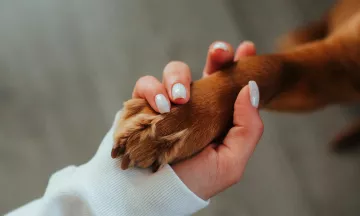Choosing a puppy and bringing it home is such an exciting time but it is also life long commitment. While it may be tempting to choose a puppy based on looks, there are many other factors you should consider. To make sure that you can enjoy life with your beloved dog for the duration of his or her entire lifespan, it’s important to answer these questions first.

Cooper, the puppy of Pawshaker Sanni
1) How much time will I have for the puppy?
When choosing a puppy, consider the breed and that particular puppy's energy levels and exercise requirements. Energy level differs from dog to dog, but at a minimum, every dog will need to go for a daily walk. However, while some dogs may be content with a walk, others may need a lot more. High energy dogs who don't have an outlet for their energy will end up being destructive or develop unwanted behaviours. For those dogs, you will also have to provide mental stimulation in the form of enrichment, training or even additional physical exercise like running.
Grooming requirements are also something to consider. Will you have time to brush your dog daily and check for any matting? Longer coats on dogs mean that they take longer to dry, require more brushing and more through health checks since any skin conditions may not be immediately visible.
It's also important that your dog is not alone all day. Dogs are social animals who become lonely, stressed and depressed when left alone for too long. Will you or a member of your family be there for the dog? Especially while the dog is still a puppy, they will need constant attention. It’s recommended to take off from work for at least 4 weeks when getting a puppy, and even after that, you may not be able to leave them alone for an entire work day right away. Consider hiring a pet sitter to drop in and visit your puppy if you will need to be away for extended periods of time.
2) Choosing a puppy type - pure-bred or a mixed breed?
If you are looking for a pure-bred dog, you can find registered breeders through Dogzonline. The advantage of getting a pure-bred dog is that you can consider in advance which traits would make a dog suitable for your situation. You can, for example, pick a small or a large breed, a very active one or a family-friendly and calm breed.
Don’t forget, however, that every dog is an individual and that the breed does not determine everything about the dog. How the dog develops depends on genetics, experiences, socialisation, training, exercise and the love and attention he or she gets from you. If you don't have specific preferences when choosing a puppy, check local shelters and rescue organisations instead. When choosing a rescue organisation, make sure that it is legitimate. They should have a public annual report, long term projects, good screening and matching of both dogs and prospective owners. In addition, they will ensure a clean bill of health for their puppies with vaccinations, micro-chipping and worming treatment before adoption.

Quinn, the puppy of Pawshaker Ellen
3) Choosing a puppy from a healthy and “ethical” litter?
Whether you choose a puppy from a breeder or a shelter, it’s important to know that your puppy was raised under good and healthy circumstances. Don’t be tempted to choose a puppy from the “wrong” breeder just because you feel sorry for it, because it's ready to go or more affordable. This is exactly what keeps unethical breeders in business.
It’s essential that your puppy is no younger than 7 weeks when it leaves the mother. Medical information must be available and genetic testing results should be provided from a pure-bred breeder. The rescue or breeder should welcome you to visit the little or be willing to show you photos of where the puppy was raised. When you visit the litter, the mother must be present. Pups and mother must be clean and healthy, and certainly not fearful or aggressive. Also important: the breeder must be curious about you and your suitability for their puppy. A good breeder will ask you lots of questions about the pup’s future home. Refer to the following guide from DogsNSW.
4) Can I afford a puppy?
A dog from a breeder is usually more expensive than a dog from a shelter or rescue organisation. However, don’t just take the initial cost of getting a puppy into account - even if you choose a pedigree puppy. It’s really only a fraction of how much a dog will cost you throughout his or her lifetime. Here are some additional costs you'll need to take into consideration when choosing a puppy:
- Toys
- Dog beds
- Leads, collars and other accessories
- Crate
- Food
- Possibly changes to your home, garden or car to make them dog-safe
- Yearly and monthly health care costs
- Grooming
- Insurance
- Training
- Dog walkers or dog sitters
Take all of this (plus a bit of a extra for emergencies) into account when making a weekly or monthly budget for your dog. Can you provide all of the above for the dog’s entire life span?

Juno, the puppy of Pawshaker Natalie
5) What do I want in my puppy?
It may be tempting to choose a puppy and bring it home as soon as you have decided to get one. Think about what you want in a puppy and how the puppy will fit into your life. Do you want a puppy that can spend a lot of time with you snuggling? Or do you do lots of hiking and outdoor activities? Do you want a puppy that is super outgoing or one that is more calm? Once you have a clearer idea of what you want, it makes choosing a puppy a lot easier.
Remember your lifestyle and requirements when choosing a puppy. You also don't have to choose the first puppy you see. If none of the puppies in a litter are suitable for you, be prepared to walk away. It's very easy to get caught up in the moment and choose a puppy because they are all so adorable and available. However, if it's not a good match for your lifestyle, the puppy could end up developing behavioural issues due to under stimulation or end up being a cause of friction within the family. For this reason, if you have kids, it's best to not to bring them with you the first time you visit a litter as it can be very hard not to disappoint them if none of the puppies are suitable.

Charlie, the puppy of Pawshaker Ben
Naturally, puppies are a lot of fun, irresistible even, but they are a lot of work, too! It’s not far fetched to compare caring for a puppy with caring for a baby, it really does take up that much of your attention. Young dogs have a ton of energy and your puppy may, despite your best training efforts, turn into a very trying adolescent. In just a few months, your puppy turns from a sweet little thing to a gangly teenager into a grown-up, who will, with any luck, be with you for 15 years. Perhaps consider whether you could love a more settled, older dog just as much? The shelters are brimming with older dogs deserving of a second chance and adopting a dog is a rewarding experience.





